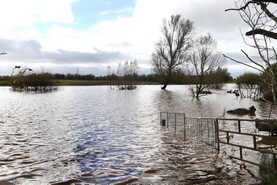The Department of Agriculture sent a circular to all organic livestock farmers this week outlining exceptional provisions to address fodder and bedding shortages. Organic livestock farmers are very exposed when it comes to bedding shortages, as 50% of the winter housing area must be solid (ie not slatted).
Likewise, some organic farmers have found it difficult to source adequate organic fodder this year due to poor growth this summer.
In the circular, the Department said that it may authorise, on a temporary basis, the use of non-organic feeding stuffs for a limited period and in relation to a specific area by individual operators when forage production is lost or when restrictions are imposed, in particular as a result of “exceptional meteorological conditions”.
The temporary changes to the rules are outlined below.
Livestock bedding
For the duration of the winter housing period of 2018/2019, the use of peat as an animal bedding material is permitted.
In the case of cubicles with rubber mats, the requirement for an additional layer of litter material on top is waived for this period.
As always, straw from organic and non-organic sources is permitted, including rushes.
Non-organic forage
Organic farmers who are experiencing genuine shortages of organic forage may apply for a derogation to the Department, as the competent authority, through their organic certification body on the derogation application form. The following conditions apply:
The derogation is applicable to the Republic of Ireland and relates to the provision of non-organic fodder where it can be demonstrated that there is a pressing need to acquire such.Derogation requests will not be entered after 30 April 2019. Derogation requests must be submitted on the Department of Agriculture derogation application form available from the farmers’ organic certifying body. Each request will be evaluated separately. The number of grazing animals on the holding, their type, ages and duration of the derogation request will dictate how much non-organic fodder can be permitted under the derogation. All applicants will be notified of the decision in writing. Those granted a derogation will be authorised to source a defined quantity of fodder and directed to maintain documentary records of the source and quantity of the non-organic forage and its subsequent use. Queries on the short-term changes should be forwarded to the Organic Unit, Johnstown Castle Estate, Wexford.
The Department of Agriculture sent a circular to all organic livestock farmers this week outlining exceptional provisions to address fodder and bedding shortages. Organic livestock farmers are very exposed when it comes to bedding shortages, as 50% of the winter housing area must be solid (ie not slatted).
Likewise, some organic farmers have found it difficult to source adequate organic fodder this year due to poor growth this summer.
In the circular, the Department said that it may authorise, on a temporary basis, the use of non-organic feeding stuffs for a limited period and in relation to a specific area by individual operators when forage production is lost or when restrictions are imposed, in particular as a result of “exceptional meteorological conditions”.
The temporary changes to the rules are outlined below.
Livestock bedding
For the duration of the winter housing period of 2018/2019, the use of peat as an animal bedding material is permitted.
In the case of cubicles with rubber mats, the requirement for an additional layer of litter material on top is waived for this period.
As always, straw from organic and non-organic sources is permitted, including rushes.
Non-organic forage
Organic farmers who are experiencing genuine shortages of organic forage may apply for a derogation to the Department, as the competent authority, through their organic certification body on the derogation application form. The following conditions apply:
The derogation is applicable to the Republic of Ireland and relates to the provision of non-organic fodder where it can be demonstrated that there is a pressing need to acquire such.Derogation requests will not be entered after 30 April 2019. Derogation requests must be submitted on the Department of Agriculture derogation application form available from the farmers’ organic certifying body. Each request will be evaluated separately. The number of grazing animals on the holding, their type, ages and duration of the derogation request will dictate how much non-organic fodder can be permitted under the derogation. All applicants will be notified of the decision in writing. Those granted a derogation will be authorised to source a defined quantity of fodder and directed to maintain documentary records of the source and quantity of the non-organic forage and its subsequent use. Queries on the short-term changes should be forwarded to the Organic Unit, Johnstown Castle Estate, Wexford.






 This is a subscriber-only article
This is a subscriber-only article










SHARING OPTIONS: